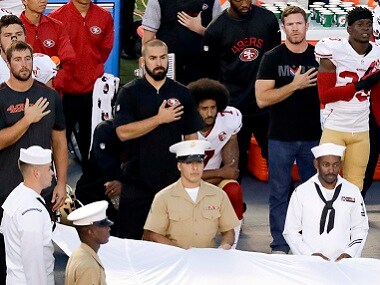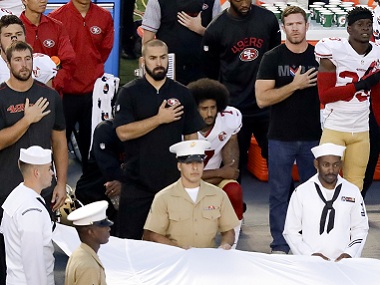First, I’d like to draw your attention to this happening last year in a cinema in Mumbai. Then, I’d like to draw your attention to another happening a few days ago, a couple of continents away. Now, let’s begin. (American) Football is as American a sport as it gets. Firstly, it’s not really football (continuing in the great American tradition of being “different” about the most mundane things). Secondly, its grand final, the Super Bowl, is the one of the most viewed sporting events in the world. Thirdly, it has arguably the most rabid fan base of all American sport. The reason for the last point might be due to the fact that its regular season runs just a shade over four months. So, fans tend to really get behind their teams for all 16 regular season games. The gentleman you saw in the second link you hopefully clicked on, may not play all 16 games. In fact, he may not play any of those games. He had an average 2015-16 season, and will compete for a starting spot with another quarterback. Yet, he’s kicked up a very interesting debate — “How far can you take the right to dissent?” [caption id=“attachment_2996122” align=“alignleft” width=“380”]  San Francisco 49ers quarterback Colin Kaepernick (centre) kneels during the national anthem. AP[/caption] If you ask the gentleman from Mumbai from the first link, you’re probably not going to get very far. But if you ask Colin Kaepernick, it’s probably a good guess that he’s on the other end of the spectrum. So, which one of them is right and who is wrong? There are several aspects to this. Firstly, one might point out that we’re in India while Kaepernick is in the US, a country that is, as pointed above, different. It’s a country where it’s alright for individuals of the same sex to marry each other and where parts of the country legally sell marijuana. You got that one right. You 1 – 0 Argument. (If you were keeping score according to association football rules, that is). Turns out though, that there is one thing where both countries share common ground — the right to not stand up during a rendition of their respective national anthems. Strictly, according to the law of the land in India, and specifically, the Prevention of Insult to National Honour Act, 1971, “Whoever intentionally prevents the singing of the Jana Gana Mana or causes disturbances to any assembly engaged in such singing shall be punished with imprisonment for a term, which may extend to three years, or with fine, or with both.” So technically, if you’re sitting peacefully, without disturbing anyone, can you truly cause disturbance? And yet, according to this Ministry of Home Affairs’ order relating to the national anthem of India, “Whenever the anthem is sung or played, the audience shall stand to attention. However, when in the course of a newsreel or documentary, the anthem is played as a part of the film, it is not expected of the audience to stand as standing is bound to interrupt the exhibition of the film and would create disorder and confusion rather than add to the dignity of the anthem.” The operative word here, being “shall”. There is no compulsion, something that the ministry has also pointed out in a judgment given during a case we shall encounter a little later. Meanwhile, in the case of 49ers’ quarterback Kaepernick, this is what the Title 36 (section 171) of the United States Code says: “During rendition of the national anthem, when the flag is displayed, all present except those in (military) uniform should stand at attention facing the flag with the right hand over the heart. Men not in uniform should remove their headdress with their right hand and hold it at the left shoulder, the hand being over the heart. Persons in uniform should render the military salute at the first note of the anthem and retain this position until the last note. When the flag is not displayed, those present should face toward the music and act in the same manner they would if the flag were displayed there.” But as this article in the Atlanta Journal-Constitution says, there was no breach of the law by Kaepernick when he knelt during the singing of the Star Spangled Banner. However, the reason the athlete chose to kneel is definitely a form of protest, over current race relations in America. And the right to dissent is seen as a core American value, so much so that on Monday, President Barack Obama actually defended Kaepernick’s protest. So, while, there is widespread consensus among the legal community in India that it isn’t illegal to sit down while the national anthem is playing, what happens, if like Kaepernick, one of us decides to stand as a form of dissent? That may just be where the similarities between India and the US end. Except it might not be that straightforward, explains Delhi-based lawyer Nikhil Mehra, “The Supreme Court has never had occasion to clarify the issue of disrespect to the national anthem on account of an individual’s refusal to stand when it is being played or sung.” Mehra, who also extensively helped with research for this story, notes the case of Chouksey vs Union of India in the Madhya Pradesh High Court, wherein the court ruled: “The dramatisation of the national anthem is against the constitutional philosophy”, asking the filmmakers of Kabhi Khushi Kabhi Gham to delete a scene in which the national anthem is invoked. A second issue raised in that case was whether or not it is mandatory to stand, in order to show due respect to the national anthem whenever it is played in whatever context. Yet, there is no final word on the matter because the Supreme Court has not had the opportunity to rule on anything similar just yet. However, the apex court did overrule the judgment of the MP High Court on a plain reading of the second sentence of Clause V(1) of the Ministry of Home Affairs Order, but that pertains to the narrow situation of the playing/singing of the national anthem in a film and the like. As legal matters go, there is no precedent, but if there’s one thing that the case of Colin Kaepernick has reminded us, it’s that the freedom of speech and constitutions of countries are indeed immutable. In India, our viewpoints on the matter may not always match, yet it is our duty to defend to continue defending free speech and protect our Kaepernicks, as much as it is propriety on our part to stand up during the national anthem. Especially, if we don’t want to let America keep being that different.
According to the law in India, whoever intentionally prevents the singing of the national anthem or causes disturbances to any assembly engaged in such singing shall be punished. But if you’re sitting peacefully can you truly cause disturbance?
Advertisement
End of Article


)

)
)
)
)
)
)
)
)



